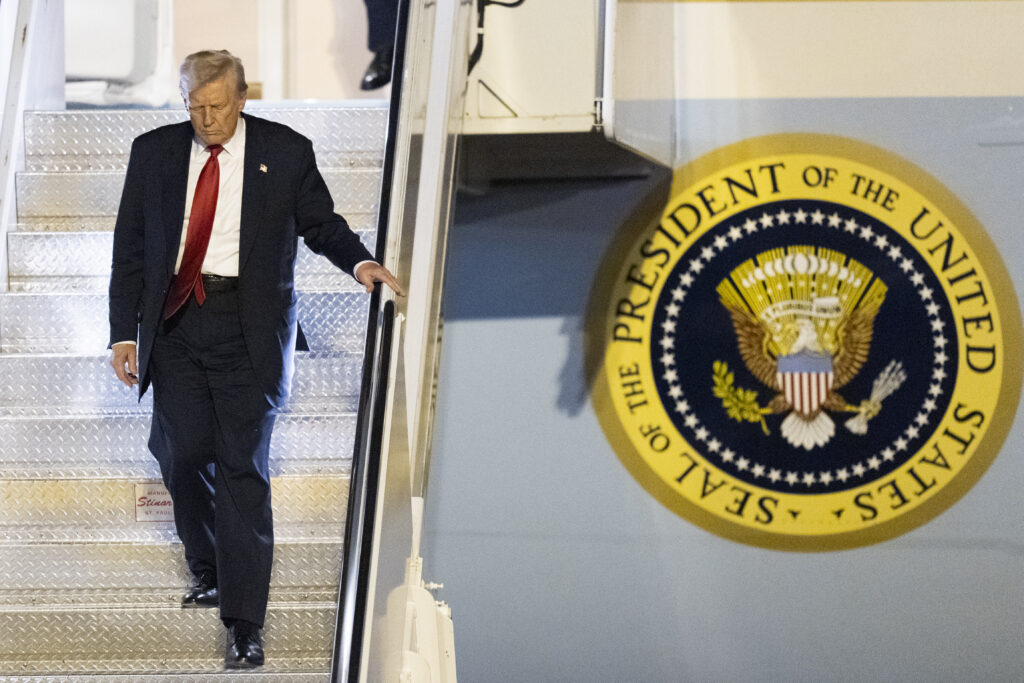Has the Trump Admin Officially Defied Court Orders?

Multiple federal courts have temporarily halted or rejected many of President Donald Trump’s opening acts of his second administration. In response, the president and several of his officials have openly challenged judicial authority, raising fears that his administration may defy court orders — and potentially ignite a constitutional crisis.
Over the weekend, the Trump administration may have pushed the country closer to that crisis by going ahead with deportations after judges had ordered that they be paused.
A federal judge Saturday temporarily blocked the Trump administration from using the Alien Enemies Act, an 18th century wartime law, to deport hundreds of Venezuelans to El Salvador without due process. Despite the order from U.S. District Court Judge James Boasberg, at least 137 people were flown to a Salvadoran “Terrorism Confinement Center.”
The Alien Enemies Act gives the president the immense power to arrest, relocate or deport any male over the age of 14 who was born in a foreign “enemy” country. It has been invoked only three times: the War of 1812, World War I and World War II.
Trump invoked the act on Friday to deport alleged members of Tren de Aragua, a transnational criminal organization that originated in Venezuela. The Trump administration has not identified the people who were deported, and has not provided evidence they are members of the gang. Nor has it said specifically what crimes they may have committed in the U.S.
The attorney for one of the men flown to El Salvador without due process said her client sought asylum in the U.S. but was detained upon entry because Immigration and Customs Enforcement alleged his tattoos were gang related.
The Trump administration also deported a Brown University professor with an American visa despite a federal judge in Boston ordering that the government could not take her out of the country without giving the court advanced notice.
David Noll, a professor of law at Rutgers Law School, said the deportations appeared to defy the court orders, though he stressed that the timelines around when the orders were issued and when the deportations occurred still need to be clarified.
“It seems that at a very minimum, the court’s orders were ignored, and, more likely, that there was an intentional choice to not comply with them,” Noll said.
“Court order defied,” national security attorney Mark Zaid said in a post. “First of many as I’ve been warning and start of true constitutional crisis.”
According to a timeline of the deportations to El Salvador compiled by Adam Isacson, the director at the Washington Office on Latin America, at least three flights reached San Salvador several hours after Boasberg issued a temporary restraining order blocking the Trump administration from deporting people using the Alien Enemies Act.
Two of the flights were in the air when Boasberg, who was appointed by former President Barack Obama, issued his order. Another flight departed Harlingen, Texas, almost an hour after the order was issued.
The lawsuit over Trump’s invocation of the Alien Enemies Act was brought by five Venezuelans represented by Democracy Forward* and the ACLU.
In a filing late Monday, Robert Cerna, an acting official at the Immigration and Customs Enforcement, claimed that those removed were “carefully vetted” and posed “an extraordinary threat to the American public.”
However, Cerna also said many of those “removed under the [Alien Enemies Act] do not have criminal records in the United States” and that the government lacks “specific information
about each individual,” though he claimed that the lack of information “actually highlights the risk they pose.”
El Salvador’s President Nayib Bukele’s social media post mocking Boasberg’s order was reposted by multiple Trump officials, including Secretary of State Marco Rubio.
According to a statement by White House press secretary Karoline Leavitt, the administration “did not ‘refuse to comply’ with a court order. The order, which had no lawful basis, was issued after terrorist TdA aliens had already been removed from U.S. territory. The written order and the Administration’s actions do not conflict.”
“A single judge in a single city cannot direct the movements of an aircraft carrier full of foreign alien terrorists who were physically expelled from U.S. soil,” Leavitt’s statement continued.
“That’s completely risible,” Noll said. “The court has jurisdiction over parties that are located in Washington, D.C., and all of the relevant decision makers were located in Washington, D.C., and they had authority to direct the planes to turn around.”
Department of Justice officials have also argued that Boasberg’s order wasn’t enforceable because he issued it orally.
“They definitely ignored the court’s order,” said Ahilan Arulanantham, co-director of the Center for Immigration Law and Policy at the UCLA School of Law. “They have some explanation as to why they did that. For me, the explanation feels disingenuous.”
Arulanantham said the normal practice in cases where there’s confusion between a court’s written and oral orders is to seek clarification from the court. “Here, there was nothing unclear about what the court had ordered.”
Trump administration officials, including Attorney General Pam Bondi, have also said that Boasberg supported terrorism by issuing the order, while members of Congress have called for his impeachment.
Boasberg scheduled a Monday hearing for the government to address allegations that it defied his order. Just minutes before the hearing was set to begin, the Justice Department asked the D.C. Circuit Court of Appeals to remove Boasberg from the case.
“I could see this ending in a very hot showdown between the courts and the executive,” Noll said, though he added that it depends on how vigorously courts pursue contempt proceedings.
*Democracy Docket Founder Marc Elias is the chair of Democracy Forward’s board.